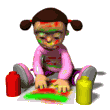
Developmental Cognitive Neuroscience Laboratory: Faculty Publications
Document Type
Article
Date of this Version
2011
Citation
Journal of Child Psychology and Psychiatry 52:1 (2011), pp 33–46; doi: 10.1111/j.1469-7610.2010.02265.x
Abstract
Background: Despite the widespread recognition of the importance of executive control (EC) in externalizing psychopathology, the relation between EC and problem behavior has not been well characterized, particularly in typically developing preschoolers.
Method: Using the sample, battery of laboratory tasks, and latent variable modeling methods described in Wiebe, Espy, and Charak (2008), systematic latent dimensions of parent-rated problem behavior, measured by integrating scales from developmental and clinical traditions, were determined empirically, and then were related to EC.
Results: Substantial relations between EC and problem behaviors were revealed by extracting the common variance of interest and eliminating extraneous variance, which were robust to estimated child intelligence and differed somewhat in preschool boys and girls.
Conclusion: Preschool EC measured by laboratory tasks appears to tap abilities that strongly and robustly support broad control processes enabling behavioral regulation across cognitive and emotional domains.


Comments
Copyright © 2010 Kimberly Andrews Espy, Tiffany D. Sheffield, Sandra A. Wiebe, Caron A.C. Clark, and Matthew J. Moehr. Published by Association for Child and Adolescent Mental Health. and Blackwell Publishing, division of John Wiley & Sons. Used by permission.